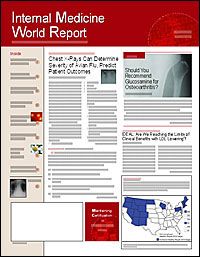Many Physicians Lacking Knowledge about Genital HPV Infection
Washington,?DC?Health care providers in the United States lack critical knowledge about genital human papillomavirus (HPV), according to the results of a survey released at the 45th Annual Inter?science Conference on Antimicro?bial Agents and Chemotherapy.
Lack of complete knowledge about HPV may lead some clinicians to provide improper disease management or inappropriate counseling and prevention messages to their patients, said Nidhi Jain, MD, at the Centers for Disease Control and Prevention in Atlanta.
The survey was conducted from May to September 2004 and included 4305 health care providers who were asked to agree or disagree with specific statements about HPV and related conditions. The health care providers surveyed were physicians specializing in obstetrics/gynecology, urology, dermatology, family practice, internal medicine, or adolescent care, and nurse practitioners, nurse-midwives, and physicians' assistants.
Of those surveyed, 89% agreed with current scientific evidence that genital HPV infection is common in sexually active persons, 95% knew that patients may lack signs or symptoms of infection, and 98% agreed that persistent HPV infection in women increases the risk of cervical dysplasia and cancer.
Almost two thirds (65%), however, did not know that most HPV infections clear without medical intervention or that the presence of genital warts does not increase the risk of cancer at the same site (62%). In addition, more than half (53%) did not know that genital HPV types usually associated with anogenital warts differ from types associated with cervical dysplasia and cancer.
Level of knowledge consistent with current evidence was greatest among obstetricians/ gyn??ecologists and nurse-midwives and worst among dermatologists and urologists.
Clinicians who use HPV testing had a higher percentage of correct responses to the knowledge questions than clinicians who do not use or are not aware of HPV testing. "However, even the highest percentages were sometimes fairly low," said Dr Jain. "Only about half of clinicians who use HPV tests knew that genital HPV types usually associated with anogenital warts differ from types associated with cervical dysplasia." Fewer than half knew that most genital ?HPV infections may be cleared without medical intervention.
Dr Jain said that health care providers' lack of knowledge that most HPV ?infections clear without medical inter??vention is cause for concern and may lead to unnecessary medical care. Similarly, a lack of understanding of the different HPV strains may lead physicians to ?incorrectly counsel women with genital warts that they are at increased risk for ?cervical cancer.?W.K.
